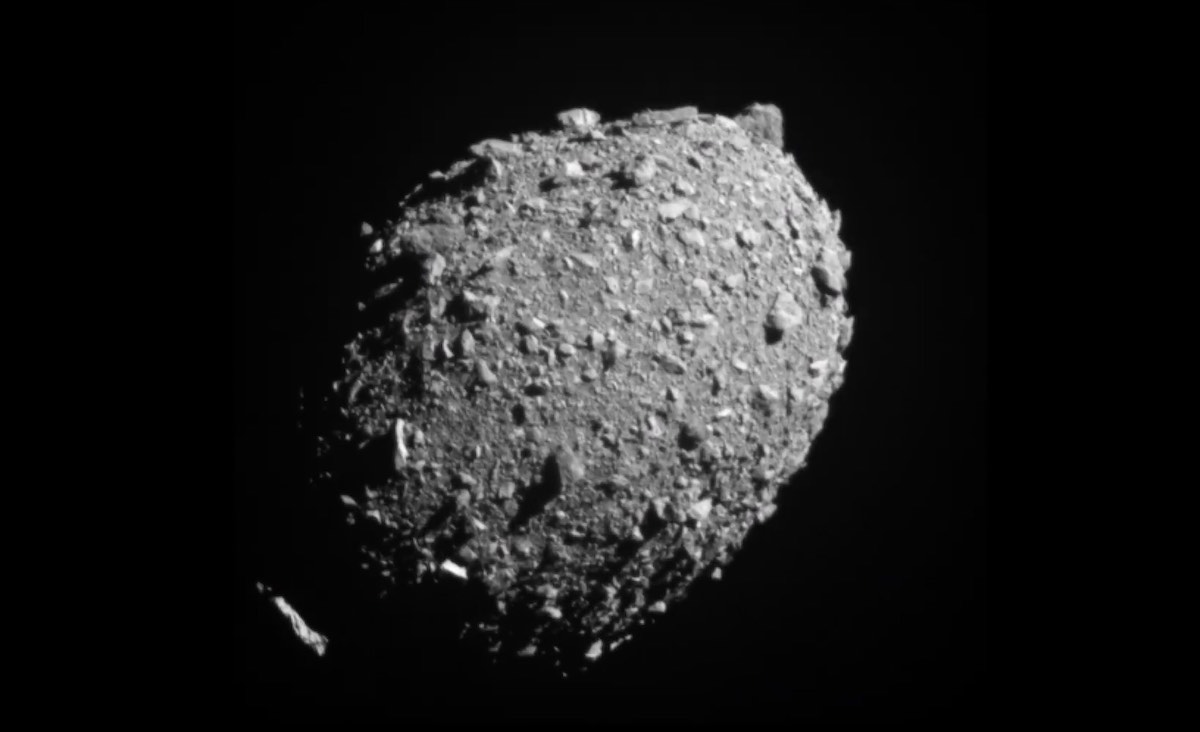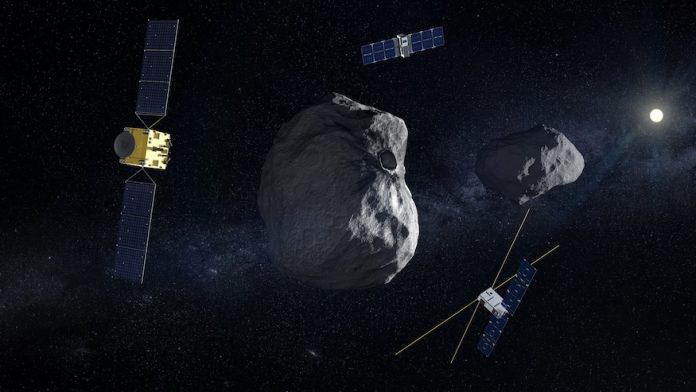
The European Area Company is on the cusp of launching its first planetary protection mission, a complement to NASA’s 2022 Double Asteroid Redirection Check (DART) mission. The objective of those missions is to grasp how Earth will be protected against a probably harmful asteroid strike.
On Thursday, the Hera spacecraft, together with two CubeSats, are set to be encapsulated contained in the fairings of a SpaceX Falcon 9 rocket forward of a deliberate launch on Monday, Oct. 7. The second will start a roughly two-year journey out to the binary asteroid system of Didymos and its moon, Dimorphos.
At hand is a mission to review the impacts left by DART when it collided with Dimorphos in 2022, shortening is unique 11-hour 55-minute orbit round Didymos by 32 minutes. The trio of spacecraft on the Hera mission will arrive at their goal in 2026 to start a six-month mission, making observations of the crater left by DART and accumulating different information.
The mission that just about wasn’t
The idea of a twin satellite tv for pc mission to an asteroid was initially pitched as an enterprise, referred to as “Don Quijote,” and would’ve been solely inside ESA. Ian Carnelli, Hera’s challenge supervisor, mentioned that within the early 2000s, the idea was a tough promote to political leaders wanted to finance the enterprise.
“It was tremendous tough to promote to our resolution makers. A mission that was not science, not purely know-how, no human exploration, no robotic exploration. So, it was utterly exterior of any of the schemes that had been in place,” Carnelli mentioned. “Planetary protection didn’t exist. A planetary protection program didn’t exist within the company and once you had been explaining and attempting to promote the mission to these deciding, more often than not they might snicker.”
In 2011, throughout a planetary protection convention in Bucharest, Romania, earnest discussions started between Carnelli and his scientists and NASA’s Utilized Physics Lab (APL) in regards to the concept of visiting a binary asteroid. From these conversations got here the Asteroid Influence and Deflection Evaluation (AIDA), which consisted of NASA’s DART and ESA’s Asteroid Influence Mission (AIM).
Beneath this mission design, AIM would arrive at Didymos and Dimorphos previous to DART and be there to witness the impression and the aftermath. Carnelli mentioned he was optimistic about their prospects of getting monetary backing from the European member states after NASA gave some funding to DART. Nevertheless at a gathering of ESA member nations in 2016, European area ministers determined to place their cash into different initiatives.

“Ministers and colleagues and all people was completely satisfied we had been going to get the funding. And my hope began actually to construct. It was quite a lot of effort to get even to that time, to be even tabled for discussions for the funding. It was one thing utterly new and really emotional,” Carnelli mentioned. “After which in 24 hours, that dream simply collapsed.”
He and his staff tried quite a few workarounds to scale back the price of the mission or simplify it in ways in which would make it extra palatable for funding. After practically giving up, Carnelli mentioned the mission’s principal investigator, Dr. Patrick Michel, gave him some phrases of encouragement to maintain him going.
“[He] mentioned, ‘Look, we’re so shut. We can’t quit now.’ And he gave me the little enhance to make one other attempt to so, I contacted the German delegates to the German Area Company and mentioned, ‘Look I believe we might nonetheless do one thing,’” Carnelli recounted. “DART is shifting ahead. Allow us to proceed a couple of extra months to see if NASA truly approves DART.”
That pitch received the staff about 4 million euros, which allowed them to press ahead whereas “working on fumes.” However that was sufficient for them to get by the purpose of NASA approving DART and for them to get much more than they had been asking for throughout the 2019 ministerial.
“In 2019, we had been asking for 160 million euros to cowl the commercial price and we had greater than 180. So, we even had extra money than we requested, which was a giant aid for us,” Carnelli mentioned. “Made us extra snug to work and place all of the contracts. And I believe the opposite constructive aspect of this story is that by that point, the entire scientific payloads had been very effectively outlined. And so, once we signed the contract in 2019, the whole lot was tremendous clear.”
The problem introduced by the Covid-19 pandemic the next 12 months supplied a contemporary wave of challenges, not solely to the workforce, but in addition to their provide chain.
“Manufacturing had stopped and components had been principally, not stolen, however purchased by many individuals, a lot sooner and shares had been depleting. And silly issues like connectors or harnesses, generally even brackets, I imply, quite simple stuff was simply not there anymore,” Carnelli mentioned. “So, that was wild. That was very wild.”
Throughout a prelaunch press briefing, Carnelli mentioned the staff labored relentlessly go get the mission to the end line.
“The combination staff at OHB (Hera’s prime contractor) did an incredible job. The final items had been delivered in April, Might 2024 they usually managed to actually assemble the satellite tv for pc in three, 4 months and ship it… on the finish of August,” he mentioned. “It was actually an incredible challenge and I can solely be extraordinarily happy with what all of us achieved collectively.”
Flying companions
Driving alongside the first Hera spacecraft are a pair of small spacecraft, referred to as CubeSats: Juventas and Milani. The previous is “dedicated to the geophysical characterization of Dimorphous,” in keeping with ESA, and the latter is “dedicated to the visible inspection and mud detection of Didymos asteroid following DART impression.” The scale of a CubeSat is measured in items abbreviated to “U” which might be every 10 cm x 10 cm x 11.35 cm (3.94 in x 3.94 in x 4.47 in).
Carnelli mentioned these two 6U CubeSats got here into the image in 2014, however had been initially envisioned as 3U CubeSats. He mentioned they should be upscaled “to permit the CubeSats to be significant for what we had been doing, to include propulsion and have sufficient payload to embark within the further complexity of getting the CubeSats.”

The DART spacecraft was accompanied by the LICIACube (Gentle Italian CubeSat for Imaging of Asteroids), which was constructed by the Italian Area Company. Nevertheless, as a result of Juventas and Milani had been constructed with contracts coping with ESA instantly, it introduced some new challenges.
“After we do contracts from ESA, then we’re obliged to make use of European elements from these nations collaborating, which signifies that we needed to develop European radio, deep area radios. We needed to develop particular propulsion techniques in Europe,” Carnelli mentioned. “We needed to develop much more know-how than on the time weren’t obtainable but in Europe.”
Rocket journey remix
A part of the saga of the Hera mission was discovering a journey to area. When the mission was pitched throughout the 2016 ministerial their plan was to make use of a Soyuz rocket, launching from French Guiana. Carnelli mentioned launching earlier than DART, “we might have accomplished it with a a lot decrease power.”
After they missed that chance, they needed to pivot to at the very least a medium-lift automobile, which led them to the Ariane 6 rocket. After some dialogue in regards to the want for true redundancy, particularly given their uncompromising launch window of 20 days, Carnelli mentioned they ultimately had been in a position to e-book SpaceX’s Falcon 9 because the backup.
When the Ariane 6 hit growth delays, ESA determined in 2022 to maneuver Hera to the Falcon 9. In an effort to get extra efficiency out of the spacecraft, they are going to be utilizing a completely expendable model of the Falcon 9 rocket.
“We’re going to make use of principally each single drop of propellant they’ve on board as a result of we’re going to a really energetic orbit,” Carnelli mentioned. “This would be the quickest ESA spacecraft ever launched and due to this fact, that’s truly why we’d like fairly a little bit of propellant onboard.”
Nevertheless, following the supply of the Crew-9 Dragon spacecraft to low Earth orbit on Sunday, Sept. 29., SpaceX mentioned in a quick social media publish that there was “an off-nominal deorbit burn” which precipitated the higher stage to “safely [land] within the ocean, however exterior of the focused space.”
The final time #HeraMission‘s radar-bearing Juventas CubeSat is seen with human eyes, being loaded aboard its Deep Area Deployer. The following time it’s viewable will likely be when it’s ejected into area across the Didymos binary asteroid, together with Hera’s 2nd CubeSat, Milani… pic.twitter.com/KS3ahPAtVp
— ESA’s Hera mission (@ESA_Hera) October 1, 2024
Throughout an interview with Spaceflight Now on Tuesday, Oct. 2, Carnelli mentioned they’ve been “knowledgeable about what’s the most possible trigger and we’re preserving our launch marketing campaign nominal.” Liftoff is focused for Monday, Oct. 7.
“We’re doing all we will. SpaceX goes to submit their report back to the FAA, they mentioned, by the top of the week and at that time, we’ll be within the palms of the FAA,” Carnelli mentioned. “I hope actually that we get a inexperienced gentle to maneuver to the pad and launch on Monday.”
With NASA’s Europa Clipper mission additionally set to launch throughout a mid-October planetary launch window, Carnelli mentioned he and his colleagues will likely be assembly Friday morning with Dr. Nicola Fox, the affiliate administrator for NASA’s Science Mission Directorate. They are going to be coordinating to make sure there’s a wholesome quantity of distance between their two mission launches.
“Hera is prepared for launch and I heard that Clipper can be prepared for launch,” Carnelli mentioned. “So, we simply must get all of the items of the puzzle in the suitable place: climate, FAA and all the remainder and I believe we’re good to go.
“I’m assured we are going to each launch inside our launch home windows.”

